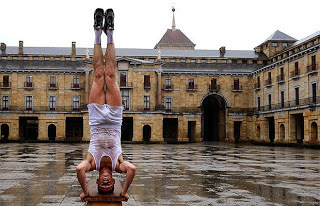Standing on My Head

...from the new edition of Adventures in Orthodoxy coming out in 2012. There are still copies of the first edition available through my website...click here.
There are some brave revolutionary souls who stand on their head every day. They are not acrobats but artists, poets, mystics, comedians and prophets. Like children, they have a fresh way of seeing and think it the most ordinary thing in the world to have a new idea, insight or enthusiasm. Furthermore, they think it most natural to share these insights and enthusiasms with others. It is their duty, their joy and their instinct to share their revolutionary insights, and they are always surprised when they are persecuted for their effort.
If these acrobatic souls are like children, then there is one famous child who speaks for them all. He is the bright-eyed boy who appears in the story of the emperor's new clothes. Everyone in the court gasped with delight at the emperor's imaginary haute couture. Everyone in the crowd pretended to admire the emperor's invisible satin suit. Only the boy in the front row had the temerity to cry, 'But he isn't wearing anything at all!' That child stands for every prophet, poet, artist, comedian and mystic in the world. He sees clearly what everybody else has been blind to, and declares with unembarrassed delight his joy at the emperor's nudity.
It is the boy's job to stand the world on its head, and in a world that is already convoluted, this means putting things the right way around. In other tales the same task falls to the court jester. In Shakespeare's plays the jester is the one who speaks the hard truth to a character who has gone soft in the head. Sometimes the jester shocks and offends with blunt but clear statements. More often he pops the balloon of pomposity with riddles, jokes, puns and poems.
Like the boy who laughed at the naked fat emperor, the jester's job is to stand on his head and then make people see themselves and the world in a fresh way. For his labors the jester is always laughed at, but never thanked. In fact, he is more often persecuted for his efforts. His clients may laugh at the clown's red nose, but they will also tell him not to poke it into their affairs. If he pushes his prophecies and jokes too far the jester may be thrown into a well, mocked, beaten or simply ignored.
This role attracts me. By nature I am one of those lugubrious optimists— liturgical on the outside, but anarchical on the inside. As the fool longs to play Hamlet, so this Hamlet has always longed to play the fool. I want to wear the jester's motley, dangle a little stick with a fool's head and a feather on the end, and wear rings on my fingers and bells on my toes. I want to scurry around in pointy slippers and poke my nose into our holy places-- both the secular ones and the sacred ones. I want to enter the holy of holies and stand on my head so I can see them from a totally new perspective. If I can manage the gymnastics, then the floor may become the ceiling and the ceiling the floor. What seemed sacrosanct may turn out to be mundane, and what was mundane may burn with meaning.
Published on November 14, 2011 10:56
No comments have been added yet.
Dwight Longenecker's Blog
- Dwight Longenecker's profile
- 80 followers
Dwight Longenecker isn't a Goodreads Author
(yet),
but they
do have a blog,
so here are some recent posts imported from
their feed.



